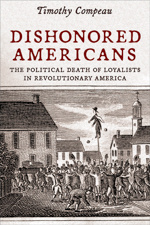Today, we are happy to bring you our conversation with Timothy Compeau, author of Dishonored Americans: The Political Death of Loyalists in Revolutionary America.
What inspired you to write this book?
I grew up in a little Canadian town settled by Loyalists, and I was always intrigued by their stories of persecution and exile in the American Revolution. When I started grad school, my PhD supervisor introduced me to scholarship on eighteenth-century honor culture, and that inspired me to revisit the Loyalists and reconsider how they and their enemies understood the conflict within that cultural dynamic. My research revealed fascinating and often harrowing stories of American colonists who endured dishonor and exile rather than support the Revolution, and I am eager to share this history with readers.
What did you learn and what are you hoping readers will learn from your book?
When people think about honor culture, they usually think about duels. While these violent encounters were part of eighteenth-century culture, one of the first things I learned was that honor culture was expressed more through everyday signs of respect. Honor culture maintained power and privilege for some, and degradation and unfreedom for many others. People invested gestures, objects, and words with intense meanings that are not so clear to us after 250 years. So, I hope readers discover the strangeness of this era, recognize how differently people thought, and consider how these important yet at times subtle cultural elements directly shaped events in the American Revolution.
What surprised you the most in the process of writing your book?
The process of reconciliation surprised me the most, especially the way that honor culture smoothed the path to healing. The bitterest Loyalists seemed to eventually reconnect with their homelands in some way, and even diehard exiles returned to the United States for visits now and then later in life. Although the war was extremely violent, and animosities lingered, many white Loyalists and Patriots eventually reconciled either at home or across a new border. This book begins with political death and ends in rebirth. It’s painful history, but it is also a hopeful, if complicated, story about how societies can heal after a conflict.
What’s your favorite anecdote from your book?
I came across scores of great stories while researching the book, but I suppose my favorite anecdote must be the prisoner experience of British Major Christopher French which shows up in chapter 2. He spent his captivity in Hartford being as obnoxious and stubborn as he could. His loathing for the New Englanders drips off every page of the diary he kept. French embodies all the popular stereotypes of a puffed-up British officer, so his writings are often hilarious. Yet he also provides some of the best commentary on honor culture I found in my research. I would love to come back to his story in the future.
What’s next?
I have two projects on the go: the first is a family history of one of the Loyalists featured in Dishonored Americans and I am excited to take readers on a deep dive into an untold but extraordinarily well-preserved tale of war, exile, and migration. Then I am switching gears a bit, and I’ve begun exploring the broader imperial and trading connections that tied North America with India in the Age of Revolutions. This is an exciting new challenge, and I am looking forward to the journey!





